Search the Special Collections and Archives Portal
Search Results
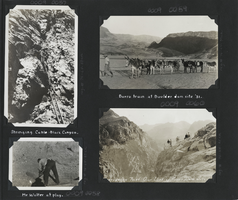
Photograph album, Henry Wieking Collection, circa late 1920s-early 1930s, page 11
Date
Description
Image
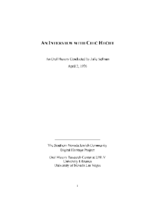
Transcript of interview with Chic Hecht by Julie Sefman, April 2, 1976
Date
Archival Collection
Description
Interview with Chic Hecht Julie Sefman on April 2, 1976. In this brief interview, Hecht talks about his time in the state senate working to bolster the budget with sales tax and gaming tax, starting a community college and health programs. He also talks about Pop Squires, a newspaper man and advocate for building Hoover Dam, who had a home on the site of Chic Hecht's clothing store on Fremont Street. Hecht also describes his time in the military and his involvement with the Military Intelligence Association.
Text

Transcript of interview with John and Mabel Dillingham by Sonny Le Jeune, March 19, 1978
Date
Archival Collection
Description
On March 19, 1978, John (Sonny) Le Jeune interviewed John (born 1904 in Trail Creek, Idaho) and Mabel Dillingham. The two provide many historical accounts of Las Vegas, Nevada, including John’s work on the railroad, the development of the city, and their living conditions when first moving to Las Vegas. The three also discuss prominent members of the community, recreational activities, church membership, and popular attractions around Las Vegas. Other topics include the building of Hoover Dam, the site of the Stewart Ranch, early irrigation systems, flood control, and Block 16.
Text
Lucile Bunker oral history interview
Identifier
Abstract
Oral history interview with Lucile Bunker conducted by herself on March 10, 1977 for the Ralph Roske Oral History Project on Early Las Vegas. Bunker recalls her early experiences and various jobs in Las Vegas, Nevada. She also describes her experiences as the wife of former Senator Berkeley Bunker and living in Washington, D.C.. Bunker then discusses her missionary work, the early above-ground atomic testing, and the building of Hoover Dam.
Archival Collection
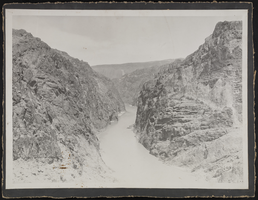
Colorado River in Black Canyon, Arizona: photographic print
Date
Archival Collection
Description
Image
John D. Gieck oral history interview
Identifier
Abstract
Oral history interview with John Gieck conducted by James Greene on January 08, 1975 as part of the UNLV University Libraries Oral History Collection. Gieck discusses living in Boulder City, Nevada.
Archival Collection
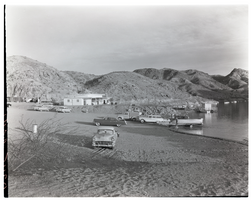
Film transparency of Willow Beach, Arizona, 1956
Date
Archival Collection
Description
Image
Morrison Family Photograph Collection
Identifier
Abstract
The Morrison Family Photograph Collection (1917-1933) consists of black-and-white and color photographic prints, negatives, and slides. The images primarily depict the Morrison family in Las Vegas, Nevada and the surrounding areas. Images portray youth activities in Nevada, including a local Boy Scouts Troop, Las Vegas High School students, Clark County High School students, as well as student activities at the University of Nevada, Reno. Also included are images of scenes around Las Vegas, including Mount Charleston, Little Falls, and the Colorado River prior to the Hoover Dam (Boulder Dam). Other images include Morrison family trips to California, Utah, Oregon, and Arizona.
Archival Collection
Henry Wieking Papers
Identifier
Abstract
The Henry Wieking Papers (1932-1935) contain personal recollections, daily journal pages, newspaper clippings, and a Bureau of Land Management (BLM) memorandum.
Archival Collection
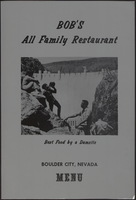
Bob's All Family Restaurant menu
Date
Archival Collection
Description
Text
